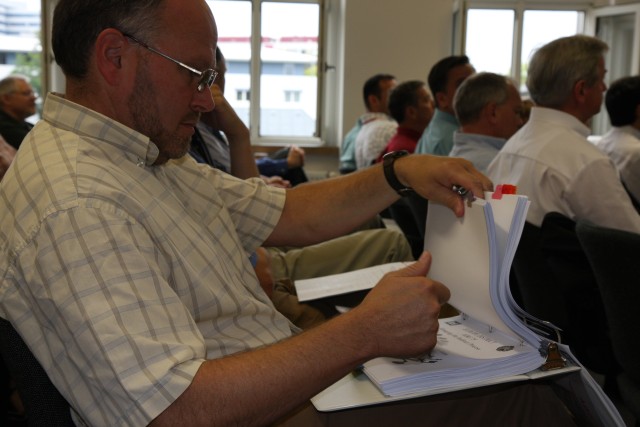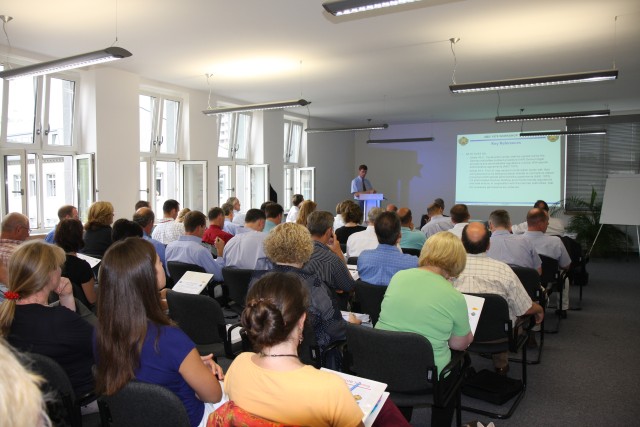WIESBADEN, Germany - Executing a construction project in Germany is as easy as A, B ... G'
ABG 75, or Auftragsbauten GrundsAfA$tze 1975, is an agreement between the U.S. and German governments that defines the process of how to accomplish construction works in Germany, both the direct and the indirect processes.
The direct process is used by the U.S. to carryout projects by letting contracts directly to industry or using troop or in-house construction assets. The indirect process is used to order the German Construction Agency to accomplish construction projects on behalf of the U.S. using their own contracting and execution procedures.
But for members new to working with the GCA, ABG 75 is a challenging process.
So the U.S. Army Corps of Engineers Europe District and Installation Management Command-Europe hosted the AGB-75/VOB Training Conference August 25 and 26 at the PolizeiprAfA$sidium in Wiesbaden, Germany, to familiarize attendees with the ABG 75 process and provide guidance in establishing better working relationships with their German counterparts.
Members from the Europe District, IMCOM-E, U.S. Air Forces in Europe and various garrison Directorates of Public Works, more than half with less than two years experience working with the GCA, received training from leading experts from IMCOM-E, the District and the industry.
Presenters included Prof. Dr.-Ing. Lothar Ruf from RKS Ingenieure (Engineers); Lee Davis from IMCOM-E; Dave Nichols and Bernhard Ochsenreither from the Europe District; and Dipl.-Ing. Heidi Meissner and Dipl.-Ing. Erhard Frey from the Europe District.
Constructing a project in Germany is not the same as in the U.S. and with so many new people, it is essential they receive an overview of the host nation construction contracting environment they'll be operating in, said Kris Hurst, chief of the District's project management branch who sponsored the training.
"The training was a mile wide and an inch deep, but in practice they will have to go deeper into many of the topics presented," Hurst said. "Now they have the resources, both materials and personnel, to help them through the process."
Under ABG 75, the U.S. contracts with the German government construction agencies, or BauAfA$mter, to execute construction works of all types to include some maintenance and repair projects.
Newcomers quickly find they have a lot learn and even those with experience are seeing changes to the process, said Erhard Frey, assistant branch manager for Host Nation programs who was instrumental in organizing the training.
"There have been some changes to ABG 75 and it's good for them to know not only what those changes are and when they go into effect, but also how they will impact their work with the BauAfA$mter" Frey said. "This is a complex process and these men and women have to facilitate quality completion of projects under German laws that also have to meet U.S. requirements."
Learning how the German government approaches construction contracting and how the ABG 75 process works is essential to successful project management, said Rick Flansburg, a senior project manager who has been with the District for about six months.
"We need to know how German laws affect the construction process and we need to learn better practices in working with the BauAfA$mter. This training provided good guidance all around," Flansburg said. "We [U.S. agencies] have money and requirements; the BauAfA$mter have contracting capabilities - neither can be successful without the other and so it's imperative that we develop cohesive relationships with them."
Because there was such a high demand for the training, the District is working with IMCOM to host another session in January and will continue the training on an annual basis, Hurst said.
"The ABG 75 forms the underlying framework to construct facilities for our men and women in the U.S. forces in Europe and their families so it is important that we're all on the same sheet of music to deliver quality products to our customers," Hurst said.
Related Links:
U.S. Army Corps of Engineers News
USACE Europe District Facebook
U.S. Army Installation Management Command-Europe Region
U.S. Army Corps of Engineers North Atlantic Division




Social Sharing